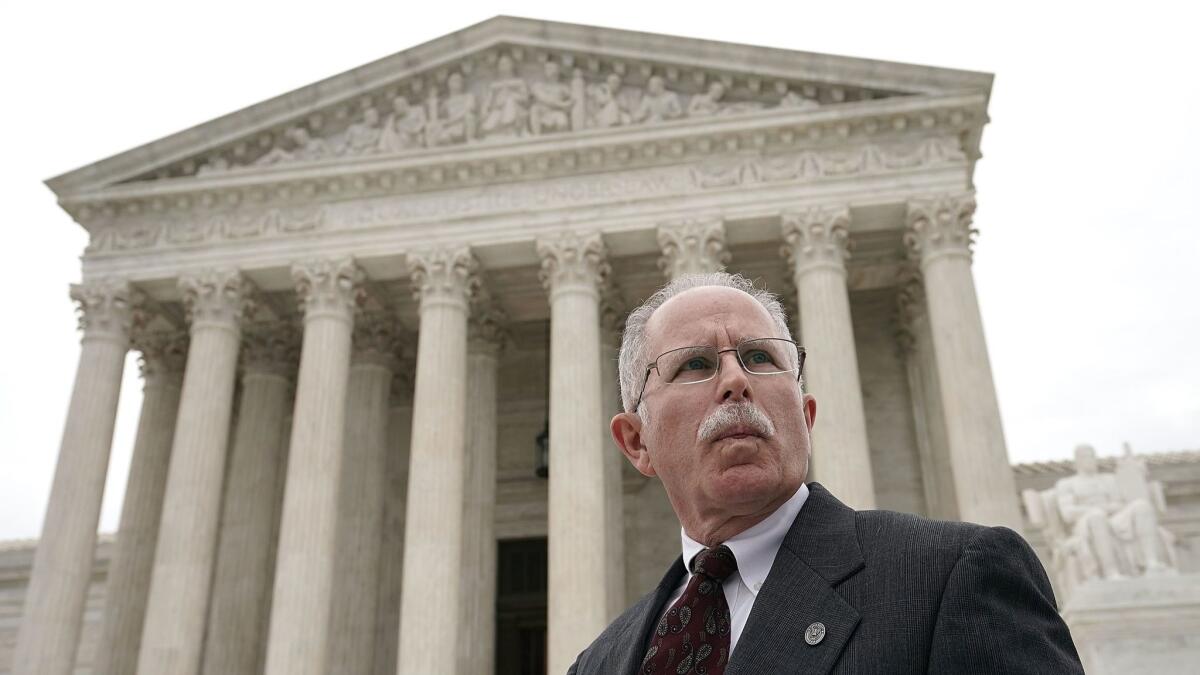Editorial: A bogus free-speech argument at the Supreme Court is union-busting in the name of the 1st Amendment

- Share via
On Monday the Supreme Court was asked — again — to engage in some union-busting in the name of the 1st Amendment.
Specifically, the justices were asked to rule that public employee unions may not require non-members to pay a fee to defray the cost of collective bargaining and other services from which they benefit. Ominously, several justices indicated in their comments at oral argument that they’re willing to do just that, overruling a 41-year-old precedent.
But the court was right in 1977 when it ruled in a case called Abood vs. Detroit Board of Education that requiring non-union members to pay “fair share” fees to a union negotiating on their behalf did not violate their 1st Amendment rights. Any burden on free-speech rights was justified, the court concluded, by the state’s interest in labor peace and preventing “free riders.”
Nothing that has occurred since then has justified overturning that precedent. But conservative activists, encouraged by opinions written by some members of the court, have relentlessly taken aim at Abood in the hopes of weakening the power of public-employee unions.
Last year, after the death of Justice Antonin Scalia, the court split 4 to 4 on a case involving a California public-school teacher who challenged Abood, leaving intact a lower court’s decision in favor of the California Teachers Assn.
This time it’s Mark Janus, an Illinois state employee, who is asking the court to overturn Abood, and he is making the same specious claim — that requiring non-union employees to help pay for collective bargaining amounts to “compelled speech” in violation of the 1st Amendment.
Janus’ argument is that, because wages and benefits for public employees have an effect on budgets and taxes, they are inherently “political” issues. Therefore a non-union employee whose fees support negotiations that result in a contract that raises his and other employees’ pay is being forced to “speak” on a matter of public concern.
That argument is more clever than convincing. And if the court were to accept it, it would be undermining the view it has expressed in other cases that public employees’ 1st Amendment rights aren’t identical to those of private citizens — as the lawyer for the state of Illinois suggested at Monday’s argument
Granted, free-speech issues would arise if workers were forced to contribute to union activities not related to the bargaining table or working conditions. Justice Stephen G. Breyer suggested that to address such concerns the court might make it explicit that “fair share” fees may subsidize only activities dealing with “wages, hours [and] working conditions” if those are the issues subject to collective bargaining under state law.
But overruling Abood altogether would be a radical rupture. As Justice Elena Kagan noted, if the court were to rule for Janus, labor laws in 23 states, the District of Columbia and Puerto Rico would be declared unconstitutional and thousands of municipal contracts covering millions of workers would be invalidated.
“What would be the justification for doing something like that?” she asked Janus’ lawyer. The answer is that there is none.
Follow the Opinion section on Twitter @latimesopinion and Facebook
More to Read
A cure for the common opinion
Get thought-provoking perspectives with our weekly newsletter.
You may occasionally receive promotional content from the Los Angeles Times.








